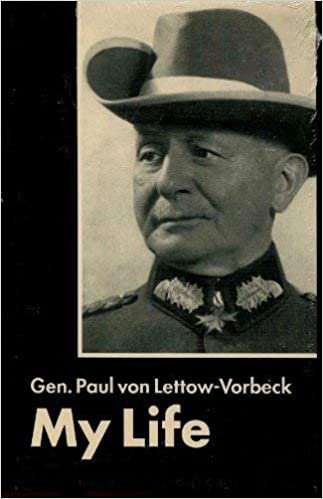Book Review: My Life: General Paul von Lettow-Vorbeck
My Life: General Paul von Lettow-Vorbeck. James Pierce, Translator. Robert Dohrenwend, Editor/Translator. Published by Rilling Enterprises, Loves Park, Illinois, 2012, hardcover, 220 pages.
Review by Greg Borzo.
This translation of General Paul von Lettow-Vorbeck’s memoirs will be of interest to scholars of colonialism, Prussian military history and World War I but few other readers.
Despite a foreword that hails von Lettow-Vorbeck as “one of the few true heroes of the 20th Century” and an introduction that describes him as “in many ways representative of the best in his society and time,” the general remains an obscure albeit successful figure whose greatest accomplishments occurred in the World War I sideshow of German East Africa (today Tanzania, Burundi and Rwanda).
Although von Lettow-Vorbeck’s account contains much history, it also includes boasting, self-justification, sniping at the French and British, and claims such as “I am certain that we could have won” the Great War.
Born in Prussia, von Lettow-Vorbeck went on to become a masterful military leader who was undefeated during four years in German East Africa despite being greatly outnumbered by Allied forces. Although he embodied the honorable, even chivalrous, Prussian military tradition, his claim to fame was leading a guerilla force: destroying forts; tearing up railway tracks; and seizing enough arms, ammunition and provisions from the enemy to continue fighting them. This was a proud, disciplined, highly decorated member of the old school fighting bush warfare, which he had claimed to despise.
Von Lettow-Vorbeck’s memoir deserved to be translated, and James Pierce did so some time ago although the work was never published. Robert Dohrenwend, the editor/translator of this tome, is to be commended for polishing up the translation and getting it published. A linguist and military historian, Dohrenwend wrote A Multilingual Glossary of Firearms Terms 1550 to 1850 and has translated a number of works dealing with German military history.
That said, it would have been helpful to the reader of this book if Dohrenwend had provide more background and context; footnotes throughout; more and better maps; a glossary; and an index.
The memoir, itself, must be read with a grain of salt. Von Lettow-Vorbeck’s daughter, who acted as editor and did an unknown amount of what she described as “sifting”, wrote the foreword to the original edition.
Still, a high school history teacher of mine (even though he was a football coach) ingrained in me the need to read original source material. This book provides that opportunity regarding a tenacious fighter, brilliant tactician, and charismatic military leader, who was also a concerned citizen, resourceful survivor and thoughtful observer during a very long life spanning a fascinating period of history, 1870-1964. Reading it will make you want to seek out a biography of this remarkable, elite Prussian warrior.

